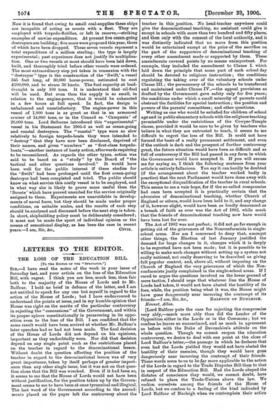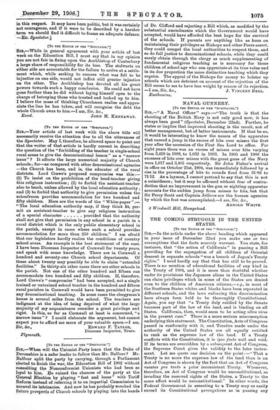LETTERS TO THE EDITOR.
THE LOSS OF THE EDUCATION BILL.
[To THE EDITOR Or TIES "SPECTATOR."]
have read the notes of the week in your issue of Saturday last, and your article on the loss of the Education Bill, with regret. I think you are less, much less, than fair both to the majority of the House of Lords and to Mr. Balfour. I bold no brief in defence of the latter, and I am not entitled to speak for any one but myself in regard to the action of the House of Lords ; but I have endeavoured to understand the points at issue, and in my humble opinion that House was right on the merits of the particular controversy in rejecting the " concessions " of the Government, and within its proper sphere constitutionally in persevering in its oppo- sition even to the loss of the Bill. I am confident that the same result would have been arrived at whether Mr. Balfour's later speeches had or had not been made. The final decision of the House of Lords did not depend on his opinions, important as they undoubtedly were. Nor did that decision depend on any single point such as the restrictions placed on the teacher in regard to the denominational lesson. Without doubt the question affecting the position of the teacher in regard to the denominational lesson was of very great importance, taken by itself perhaps of greater import- ance than any other single issue, but it was not on that ques- tion alone that the Bill was wrecked. Even if it had been so, it seems to me that the House of Lords would not have been without justification, for the position taken up by the Govern- ment seems to me to have been at once tyrannical and illogical. The last word of the Government according to the amend: meals placed on the paper left the controversy about the teacher in this .position. No head-teacher anywhere could give the denominational teaching, no assistant could give it except in schools with more than two hundred and fifty places,
and then only with the consent of the local authority, and it was distinctly indicated that no move from this position
would be entertained except at the price of the sacrifice on the part of the supporters of denominational teaching of every other amendment made or supported by them. These amendments covered points by no means unimportant. For example, they included the amendment to Clause I. which laid down the principle that some part of each school day should be devoted to religious instruction ; the conditions regulating the taking over of the voluntary schools under Clause III.; the permanency of the schools to be transferred and maintained under Clause IV.,—the appeal provisions as drafted by the Government gave safety only for five years ; the conditions under which a small minority of parents could obstruct the facilities for special instruction ; the position and powers of the parents' committees ; and other questions.
Writing as one who would be satisfied for children of school age and in public elementary schools with the religious teaching permissible under the restrictions of the Cowper-Temple clause, provided it would be sure to be given by teachers who believe in what they are entrusted to teach, it seems to me difficult to regret the loss of the Bill. It could not have formed the basis of a really permanent settlement, and even if the outlook is dark and the prospect of further controversy great, the future situation would have been as difficult and as full of controversy if the Bill had passed in any form in which the Government would have accepted it. If you will excuse me for saying so, I think the following sentence from your article is entirely fallacious. You say it can hardly be doubted (if the arrangement about the teacher worked badly in practice) that the next Parliament would have done away with the exceptional disqualification of the teacher in rural schools. This seems to me a vain hope, for if the so-called compromise had once been accepted it is practically certain that the advocates of denominational teaching, whether Church of England or others, would have been held to it, and any change of it, however slight, would have been as loudly denounced as a breach of faith as ever was the Act of 1902, while much that the friends of denominational teaching now have would have been lost for ever.
The Act of 1902 was not perfect; it did not go far enough in getting rid of the grievances of the Nonconformists in single- school areas. Nor am I concerned to deny that, amongst other things, the Election of last January justified the demand for large changes in it, changes which it is deeply to be regretted have not been made ; but it is possible to be willing to make such changes without setting up a system not really national, not really deserving to be described as giving full popular control, and, above all, without imposing on the Church of England the very grievances of which the Non- conformists justly complained in the single-school areas. If I cared to argue the questions involved on the lower ground of mere tactics, I should urge that whatever line the House of Lords had taken, it would not have abated the hostility of its foes, while, the position being what it was, the House might have gone dangerously near incurring the contempt of its
• [Lord Balfour puts the case for rejecting the compromise very ably,—much more ably than did the Leader of the Opposition either in the Lords or in the Commons ; but we confess he leaves us unconvinced, and as much in agreement as before with the Duke of Devonshire's attitude on the whole question. Though we cannot reopen the education controversy, we desire to deal with one point at the close of Lord Balfour's letter,—the passage in which he declares that even had the Lords yielded they would not have abated the hostility of their enemies, though they would have gene dangerously near incurring the contempt of their friends. These words seem to us to be far more applicable to the action of the Lords in regard to the Trade Disputes Bill than to that in respect of the Education Bill. Had the Lords obeyed the dictates of conscience they would, we cannot doubt, have refused to place the Trade-Unions above the law. We reckon ourselves among the friends of the House of Lords, but we confess to a feeling of the kind indicated by Lord Balfour of Burleigh when we contemplate their action in this respect. It may have been politic, but it was certainly not courageous, and if it were to be described by a harsher term we should find it difficult to frame an adequate defence. —ED. Spectator.]



































 Previous page
Previous page